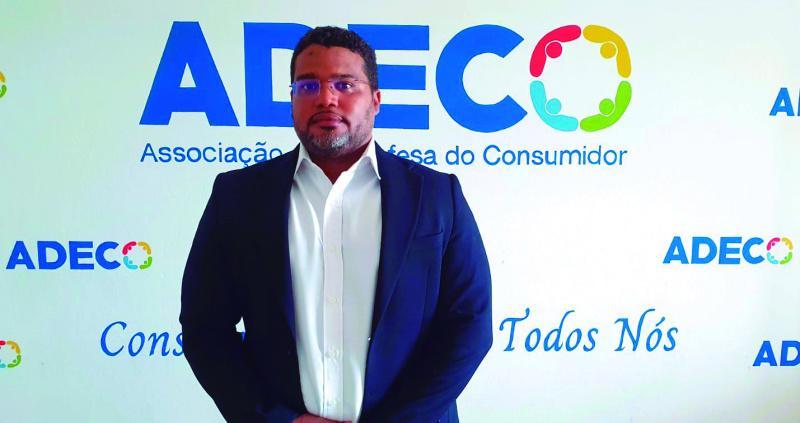By Lourdes Fortes , Nuno Andrade Ferreira
Africa-Press – Cape verde. Nelson Faria, who was elected the new president of the Consumer Protection Association (ADECO) in June, is committed to expanding the organization’s national network while improving the country’s consumer culture, with a greater awareness of rights and duties. A proposal for a more modern Consumer Law that is more suited to current market conditions is currently being drafted.
You were elected president in June, but this is a house you know well. How do you face this new challenge?
I was part of the previous board of directors and all the previous boards performed very well, from Mr. António Pedro Silva to Marco Cruz and Eva. Their performances led to ADECO’s growth in terms of reputation and membership. However, the association still faces a number of challenges.
ADECO has three areas of activity. The consumer cause is the most obvious, but the statutes also include actions related to civil society and the environment. Therefore, this challenge is more about continuing the good legacy received from my predecessors and adding what I can, together with the work team.
As the mandate comes to an end, the objectives are to increase the number of members, secure more partnerships, raise the association’s profile and raise citizen awareness of the consumer cause.
How do you view the way society views ADECO?
ADECO has grown in terms of the number of members, but not at the desired rate. I believe that we have a set of cultural causes that mean that associations are still incipient or have an expiration date for certain causes. Fortunately, ADECO has survived. It was created in 1998. Since 2008, with Mr. António Pedro Silva, it has expanded and grown. Our society acts on impulses and individual needs and collective causes are still secondary. This is our appeal, this is our mission: to raise awareness in civil society and among citizens that the consumer cause is everyone’s, because we are all consumers, from dawn to dusk, from birth to death. We are often sought out to complain when there is a need, but it is at that sporadic moment. We want the consumer cause to be ongoing. Our society is more focused on demanding, on seeking rights, but never on trying to understand what its duties are. This, as far as ADECO is concerned, is related to the fact of registering and paying the dues. People think that this is asking for a little more than what they should give.
How do you intend to work to change this mentality?
Well, it will continue to be a major challenge, but our action will be to make people understand that the rights and benefits will always outweigh the obligations when it comes to participating in the association. A monthly fee of 100 escudos is not significant. Registration involves providing personal data so that the person has a set of rights, namely legal protection, monitoring of complaints, and provision of timely and relevant information. We will continue to stress that the benefits will always outweigh the benefits.
We have noticed ADECO’s work to grow beyond São Vicente. What do you intend to do in the medium term?
The Consumer Law of 1998 states that municipalities and the State itself must participate and support the cause of consumer protection and national associations, such as ADECO. Unfortunately, we have not had the support of all municipalities in the country, and at the moment we are in Praia, Sal, Boa Vista and we have an agreement with the Porto Novo Council. These are the municipalities that have been taking part. However, we want to have at least 50% of the municipalities represented by ADECO by the end of the term. We also had a partnership with the São Vicente City Council, which is not happening at the moment by unilateral decision. In fact, the creation of ADECO had a lot of support from the former president, Onésimo Silveira, and had extraordinary support from Dr. Isaura Gomes, but unfortunately the last mayor has not been the partner that ADECO would have wanted. We intend to resume this partnership, because it is important and vital for ADECO, considering that our headquarters are in São Vicente.
Previous managements raised the issue of the need to update the Consumer Law…
The Consumer Law dates back to 1998 and is therefore completely inadequate and out of step with the times. We are working on a proposal that we will take to the government. Rather than saying that the law is inadequate and out of step, we intend to put forward a concrete proposal, naturally subject to the adjustments that the government and other partners consider. However, it must be said that, in addition to the Consumer Law, other related laws also need to be adjusted, namely the Law on the Complaints Book, which dates back to 2009 and only provided for the paper format. In this sense, we also already have a protocol to draft a bill, so that the Complaints Book Law can be adapted to the digital complaints book, due to the convenience it provides to the consumer.
In addition to changes in the law, what other measures are needed?
The mass dissemination of information, the mass dissemination of direct contact with consumers and their awareness. As I said before, we have cultural issues to overcome. Education, pedagogy, communication, being close. Getting information into schools. We have already begun to play this role. Recently, we had two programmes that involved direct contact with primary education and we intend to continue doing so.
Consumer habits have changed. We have a growing prevalence of online commerce, but there seems to be little literacy about this new reality.
There is a recent law on e-commerce, but more on the tax side. We necessarily have to adapt to the dynamics of the world and the digital issue is part of it. The world does not wait for us to be prepared for changes to happen. We will have to analyse the entire legislative landscape, regarding electronic consumption, to understand what we can propose in updating consumer law. Now, we cannot escape the paradigm of digital consumption, because it is part of our times.
What role should ADECO play?
In addition to strengthening trust with digital technology, it is important to ensure that all providers selling services or goods online are duly certified, because this certification is what gives consumers greater comfort and will enable them to trust the product they are offered. As for consumers, there are still many who are inattentive. The duty to provide information is the consumer’s duty. To consume this good or service, I have to look for information, whether the good suits my needs, what its characteristics are, whether the delivery time and satisfaction expectations are actually met. We still have very emotional consumers, in the sense that “I’m going to buy it because I want to”.
Another topic. It seems that people are still afraid to complain…
Here we have the cultural issue, the mentality of “I’m afraid to complain”, not wanting to harm so-and-so. But the complaint is made to improve the service or the good that I didn’t have access to, according to expectations. Regardless of the nature of the organizations, the consumer must be aware that he is the first and main interested party in the service improving its quality. ADECO has played this role of pedagogy, with consumers, but we still have a cultural deficit, in the sense of “it’s better to leave it alone”, or it’s better to “speak up”.
Not everything can be resolved through Facebook.
No. Facebook was not designed for this. It has its merits, but there are many issues that, if not properly formalized, have no legal support. If you want something to be handled properly, you must support your complaint with valid data and information, within a legal framework, and then hope that your complaint will be dealt with correctly.
At the beginning of our conversation you defined some medium-term goals. What are the objectives to be achieved in the immediate future?
In the short term, we want to strengthen our delegation in Praia, which is the largest consumer centre in the country and where our representation is still below what we would like. This is a short-term objective. Internally, we want to strengthen the group of fantastic technicians we have working for us, because they are people with a level of availability and dedication to the consumer’s cause that is rarely seen today, with a very high level of availability and technical competence. We want our organisation to have the necessary resources to provide a quality service.
What about financial sustainability?
In terms of financial sustainability, this involves attracting more people [partners], also compliance with the law by municipalities, the State itself and our ability to find partners that allow us to have the financial means to guarantee this sustainability.
Text originally published in the printed edition of Expresso das Ilhas no 1184 of August 7, 2024.
expressodasilhas
For More News And Analysis About Cape verde Follow Africa-Press






